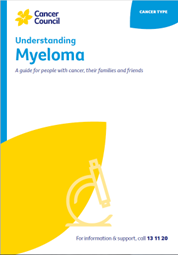Myeloma diagnosis
Myeloma is diagnosed with a combination of tests on samples of blood, urine and bone marrow. Blood tests, x-rays and other imaging scans are used to check for damage to bones and organs, such as your kidneys, caused by myeloma.
The test results also help your doctor work out the type of myeloma you have and the best treatment for you.
Learn more about:
Podcast: Tests and Cancer
Listen to more of our podcast for people affected by cancer
More resources
Dr Ian Bilmon, Haematologist, Westmead Hospital and The Sydney Adventist Hospital; Martin Boling, Consumer; Catherine Bowley, Myeloma Support Nurse, Myeloma Australia; Dr Samuel Dickson, Radiation Oncologist, Calvary Mater Newcastle; Rachelle Frith, Clinical Nurse Consultant, Haematology, Prince of Wales Hospital; Dr Wojt Janowski, Haematologist, Calvary Mater Newcastle; Yvonne King, 13 11 20 Consultant, Cancer Council NSW.
View the Cancer Council NSW editorial policy.
View all publications or call 13 11 20 for free printed copies.
Need to talk?
Support services
Coping with cancer?
Speak to a health professional or to someone who has been there, or find a support group or forum
Looking for transport, accommodation or home help?
Practical advice and support during and after treatment
Cancer information
Dealing with the diagnosis
Common reactions to a cancer diagnosis and how to find hope
View our publications
Guides and fact sheets for people with cancer, their families and friends

